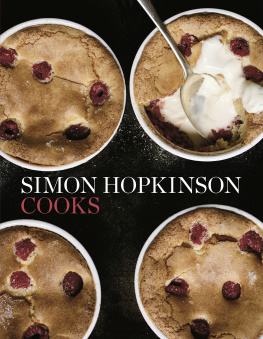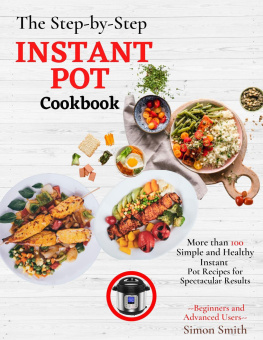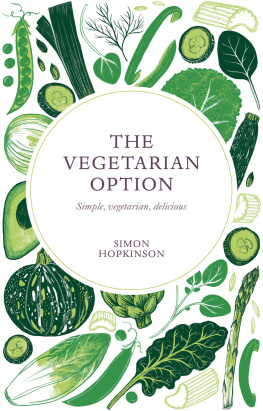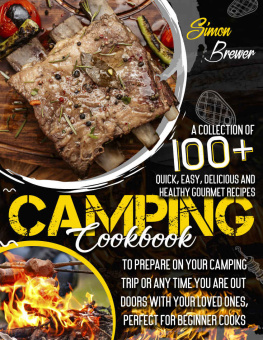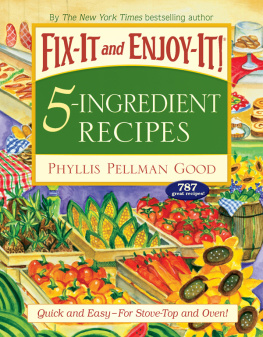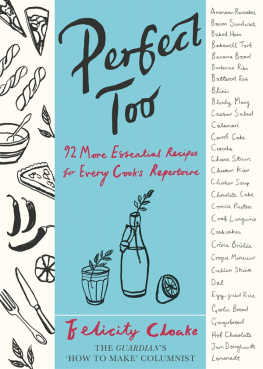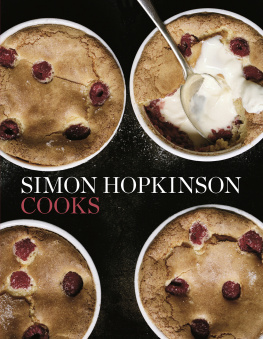This ebook is copyright material and must not be copied, reproduced, transferred, distributed, leased, licensed or publicly performed or used in any way except as specifically permitted in writing by the publishers, as allowed under the terms and conditions under which it was purchased or as strictly permitted by applicable copyright law. Any unauthorized distribution or use of this text may be a direct infringement of the authors and publishers rights and those responsible may be liable in law accordingly.
This book is published to accompany the television series entitled Simon Hopkinson Cooks , first broadcast on More4 in 2013 and produced by Ricochet Limited, a Shed Media Group Company.
Published in 2013 by Ebury Press, an imprint of Ebury Publishing.
A Random House Group Company.
Simon Hopkinson has asserted his right to be identified as the author of this Work in accordance with the Copyright, Designs and Patents Act 1988
All rights reserved. No part of this publication may be reproduced, stored in a retrieval system, or transmitted in any form or by any means, electronic, mechanical, photocopying, recording or otherwise, without the prior permission of the copyright owner.
The Random House Group Limited Reg. No. 954009
Addresses for companies within the Random House Group can be found at www.randomhouse.co.uk
A CIP catalogue record for this book is available from the British Library.
To buy books by your favourite authors and register for offers, visit www.randomhouse.co.uk
Introduction
Cooking is my joy, naturally, and has become my reason for living, but it is my profession, too. However, it constantly amazes me when the public, in general, never quite grasps that a professional cook differs from that of the domestic cook.
To illustrate this curious juxtaposition, it was interesting when an old friend at supper, and to whom, amongst others, I was serving some home-cured gravadlax, spoke up thus and in the very nicest way: Just how do you manage to cut the salmon so thin?. I was almost speechless, but then quietly muttered Um I guess you might call it expertise?.
So, there I was in a domestic situation, yet when wielding a whippy sharp knife, a skill of four decades slicing salmon thinly was completely overlooked by my chum (who also happens to be a master of wine). I very nearly parried by suggesting how astonishing that said chum could, without fail, always detect a Bordeaux from a Burgundy in a blind tasting. I didnt but what if I had?
As a professional cook writing (and making TV series) for home cooks, I also think that what I do should be grown-up. I know that this may sound a touch obvious, but I further qualify this by emphasising that it must very much be about cooking, together with skills, knowledge and an exactness of method. Helpful guidance not simply as to why certain dishes can be so enjoyable to cook, but also how wonderful they will taste if just a little time and trouble is taken in the kitchen. Cooking in more than an hour or so a working title in my head may not, how shall we say, sell a concept, but it is, in general, how I work and what I do best.
This is not to say that I am unable to put together a pleasing plate of food in a very short time, or demonstrate such a thing to others. However, I rarely think in terms of simply putting together three or four ingredients and calling it a recipe, but this idea seems to be the default way of many cooks de nos jours . There is nothing wrong with this, of course, but it has never exactly rocked my boat. I see this more as compiling, rather than integrating ingredients, thoughtfully introducing them to each other until harmoniously complete. This is the very crux of worthwhile cookery, I believe.
You may already know that this book developed from a TV series of the same name. In the planning of that series, we decided that it would be interesting to feature each programme as a menu. Not as a restaurant menu, of course, but very much influenced by a little knowledge and experience over the years, as to how one balances such a thing. To domesticate this idea, it seemed appropriate to give each menu a descriptive name relating to a particular occasion, or reminiscence. A Sunday Roast, say, one of my most favourite lunches. Or a Continental Supper, which evolved around childhood memories of my first taste of a paella, for instance, on Spanish camping holidays during the 1960s. There is also a vegetarian menu, which later became A Touch of Spice, and remains my favourite.
The six chosen menus and a further six menus written especially for this book, begin with a fine cocktail or drink, together with a suitable nibble with which to enjoy them. This is then followed by a first course, a second course and a main dish and, finally, a dessert or traditional pudding. Ones initial thought may well be that this is a lot of food! Well, it is. However, one must feel free and use simple judgement as to the kind of occasion one has in mind. The drink and nibble could go, for instance, or the middle course missed out; nothing here is set in stone. But I do think that these carefully constructed menus have a certain style to them, together with a seasonal nod and celebration of a particular occasion. It is the cook who is in charge, after all
After over 40 years of almost constant cooking, suitably seasonal menus will pop into the head of this cook in a twinkling. This is not showing off, nor appearing to be glib; it is simply a matter of ease. And so it is down to this: I know not of any other profession than cookery, which is also seen as a daily, enjoyable chore in the home. Well, that is how it used to be seen. Sadly, there are now so many options for domestic cooking not to be a daily pleasure that it quietly depresses me. For all the books, articles, television programmes on food, as well as eating out in fancy restaurants, more and more people at home simply do not cook . An astonishing number of perfectly competent folk will even choose to buy a packet of cold roast potatoes or mashed potatoes to heat up, or even ready-made Yorkshire puddings and pancakes.
Yes, I too occasionally buy a Fray Bentos steak and kidney pie, for instance, because I have always liked them (although a new recipe with the moniker classic on the tin is, sadly, not as good as the original I knew and loved). At each end of the eating curve I am as eternally fond of a fine serving of fish and chips as I am of an expertly made fruit tart from an artisan pastry shop. The domestic Parisian cook, for instance, is particularly proud of their knowledge of the finest ptisserie within their arrondissement . After all, as these sensible folk know full well, such a skill is professional, rather than domestic, so competition is futile. But would they buy a sell-by-date portion of pommes pure ? Jamais !

